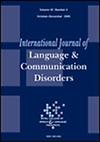Incidental learning and social-communicative abilities in children with developmental language disorder: Further evaluating the implicit learning deficit hypothesis
Abstract
Background
The implicit learning deficit hypothesis claims that impaired implicit learning underlies deficits in social-communicative abilities associated with developmental language disorder (DLD). However, previous research testing this hypothesis revealed inconsistent results and largely used process-impure sequential learning tasks.
Aims
This study further tested the hypothesis using a novel process-pure implicit associative learning task.
Methods and Procedures
The performance of 9- to 13-year-old children with (N = 60) and without DLD (typically developing, TD, N = 52) on a contingency learning task (CLT) was compared. The task entailed the incidental learning of the contingency between simultaneously presented figure-colour combinations. Also, the association of CLT performance with three aspects of social-communicative abilities was assessed: facial emotion recognition ability, social responsiveness and language abilities.
Outcomes and Results
Compared to the TD group, the DLD group performed equally on the CLT but showed worse performance on the measures of emotion recognition and social abilities. In neither group was CLT performance significantly related to any of the three social-communicative abilities.
Conclusions and Implications
These results do not support the implicit learning deficit hypothesis. The demonstrated intact implicit learning ability suggests the potential of using interventions to improve social-communicative abilities in children with DLD that are based on incidental or implicit learning rather than on intentional or explicit learning.
WHAT THIS PAPER ADDS
What is already known on the subject
- Individuals with developmental language disorder (DLD) not only have linguistic problems but also impaired abilities in social and emotional domains. According to the implicit learning deficit hypothesis, these impairments are largely due to a compromised ability to incidentally or implicitly learn regularities of stimuli or events occurring in daily life. However, research examining this hypothesis has yielded mixed results.
What this paper adds to existing knowledge
- This study contributes to the discussion about the presence or absence of a domain-general implicit learning deficit in individuals with DLD, and corresponding potential clinical implications. For this, in addition to measures of language, emotion recognition and social abilities, a novel incidental learning task was used that was held to provide a more process-pure measure of incidental and implicit learning compared to previous research. The collective results do not support the claim of a domain-general implicit learning deficit underlying the social-communicative and -emotional problems in DLD.
What are the potential or actual clinical implications of this work?
- Current interventions to improve language, social and emotional abilities in children with DLD are largely based on relatively effortful strategies involving explicit instruction and feedback. The present evidence of intact incidental and implicit learning abilities supports the examination of possible novel interventions that are based on relatively effortless implicit learning strategies, which may be more in line with how these abilities are acquired in daily life.


 求助内容:
求助内容: 应助结果提醒方式:
应助结果提醒方式:


